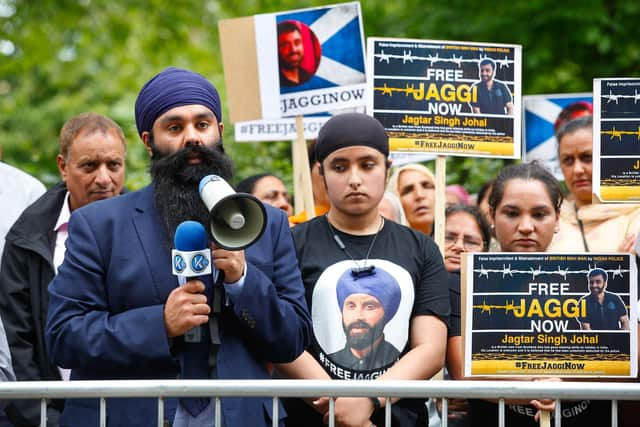Handling of Jagtar Singh Johal case exposes callousness of 'Global Britain' under Tories – Martyn McLaughlin
It is now approaching five years since Jagtar Singh Johal was snatched from the street by plainclothes officers while out shopping with his wife in India’s Punjab region.
In the time since, the Scottish Sikh claims to have been beaten and tortured by police, alleging that officers attached electrodes to his ear, nipples, and genitals, and threatened to burn him alive.
Advertisement
Hide AdAdvertisement
Hide AdMr Johal and his family also say he was subjected to a coerced confession after being forced to sign blank police statements, before being confronted with a slew of additional charges. He is principally accused of funding the purchase of weapons used to assassinate Hindu leaders – allegations he has repeatedly and strenuously denied.
On Saturday, the 35-year-old from Dumbarton was scheduled to appear for a trial hearing but, due to the non-attendance of various officials, it was adjourned without any proceedings until the end of this month.
There have been at least 235 such hearings and counting so far, yet there is still no sign of when he will stand trial, to say nothing of the wider questions about how those proceedings could possibly be fair. As things stand, he remains languishing in a Delhi prison, facing a potential death sentence.
It does not require a thorough assessment of his plight to arrive at the conclusion that the Indian authorities have breached international law by violating the young Scot’s right to liberty.


Both Reprieve, the non-governmental organisation which campaigns on human rights abuses, and Redress, the charity which fights for justice and reparation for survivors of torture, regard Mr Johal’s mistreatment as an open and shut case of arbitrary detention.
The former organisation has sent a legal memo to the Foreign, Commonwealth and Development Office outlining the multitude of reasons why such a designation should be applied.
In response, the UK Government has repeatedly refused to explain why it does not consider Mr Johal’s detention to be arbitrary. Were it to do so, it would be duty bound to intervene. Instead, a succession of ministers have offered only bluster, insisting that Mr Johal’s case has been raised at the highest levels, and that the government treats all allegations of human rights violations with the utmost gravity.
So far, this political inertia has spanned three prime ministers and five foreign secretaries, but the pressure is growing, not least thanks to the United Nations working group on arbitrary detention, which has produced perhaps the most damning assessment yet of Mr Johal’s mistreatment.


Advertisement
Hide AdAdvertisement
Hide AdThe panel has ruled that there is no legal basis for his continued detention, with not a scrap of any judicially admissible evidence against him. Its report identifies multiple violations of his human rights, and reasons that he was targeted because of his activities as a Sikh practitioner, and public protestations about the historical persecution of Sikhs by Indian authorities.
Mr Johal, the group also says, was not presented with a warrant at the time of his arrest, was refused medical treatment, and was judged “behind closed doors without the presence of his lawyer and his diplomatic representative”.
Reprieve has described the UN report as a “watershed moment” in the case, and argues that it makes clear the UK Government has a duty to act. “What is Boris Johnson waiting for?” asked its co-executive director, Maya Foa.
It is an appropriately blunt question. While Mr Johnson is keen to strengthen the UK’s relationship with India around trade, security, and climate change, issues such as human rights and international law would appear to be afterthoughts. When he met with Prime Minister Narendra Modi last month, his actions regarding Mr Johal extended to providing his counterpart with a written note of consular cases.
Yet our government has the power to escalate matters, as evidenced by its handling of the Nazanin Zaghari-Ratcliff case, when the UK afforded her diplomatic protection. Did it resolve the situation immediately? No, but it represented recognition that her treatment failed to meet Iran’s obligations under international law, and elevated it to a formal state-to-state issue. That the government is unable – or unwilling – to consider the same mechanism for Mr Johal is an affront.
One grim irony in all this is that last year, the UK joined a new Canadian-led initiative to condemn and deter the practice of arbitrary detention, describing it as a lever which “increases the diplomatic pressure on those who choose to detain foreign and dual nationals with no legal basis”.
At the same time, Home Secretary Priti Patel is pursuing her controversial deal to deport asylum seekers to Rwanda, described by Mr Johnson as “one of the safest countries in the world”.
Others beg to differ. Human Rights Watch has said that arbitrary detention, ill-treatment, and torture in official and unofficial detention facilities are “commonplace” in the African nation, while Rita French, the UK's own global ambassador for human rights, voiced fears last year that Rwanda had not agreed to "conduct transparent, credible and independent investigations into allegations of human rights violations including deaths in custody and torture”.
Advertisement
Hide AdAdvertisement
Hide AdHere we have Global Britain in a nutshell – a country where the human rights of its own citizens, and those seeking sanctuary, are sacrificed in the name of political expediency. Thankfully the Johal family will not give up their fight to stand up for what is right and just. Neither should we.
Comments
Want to join the conversation? Please or to comment on this article.
